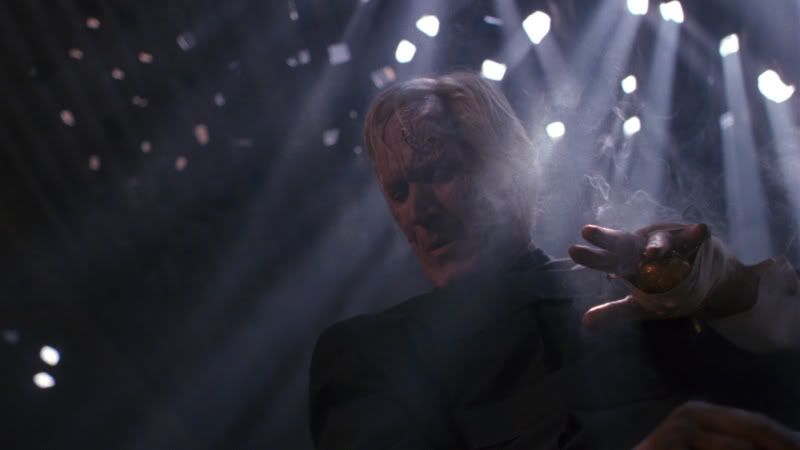Cronos is a movie that I have adored
for quite some time. One of the earliest popular films from the
director Guillermo Del Toro, who would go on to direct Hellboy, Pan's
Labyrinth, and The Devil's Backbone, is in good form here. Although
it wears its budget on its sleeve, the film is a carefully and
lovingly told tale of the burden of mortality, love, and familial
bonds.
We begin the film, after a brief
summary of the history of the Cronos device, with shop owner Jesus
Gris (played by the humble and sophisticated Federico Luppi), who
unknowingly is the owner of the device. Not much background is given
as to how he came across the statue the device is hidden in, and when
we finally see where it is hidden, it is highly unlikely that it was
never encountered before-- but this is such a minor point that it is
easily overlooked.
The reason he does go looking for the
device is indirectly related to the abrasive Angel, played by the
ever-delightful Ron Perlman. A hoodlum seemingly working under Angel
goes pawing through the artifacts in Jesus' store. When Jesus
approaches the guy (essentially because the guy Angel sends looks
like an epic douchebag with sticky fingers), he essentially runs
away, leaving Angel to look at the item he was thinking of stealing--
a highly improbable (due to it being huge) statue of an angel.
However, the hoodlum did not leave before poking a hole through the
statue's face.
Like I said, epic douchebag with sticky
fingers.
At any rate, Jesus doesn't think much
of this, until his grand-daughter, Aurora, gets 'attacked' by a
cockroach that crawls out of the hole made by the douchebag. Aurora
proceeds to flip her $hi! big time, shocking her grandfather into
telling her that, perhaps-- just perhaps-- she is just pissing off
the bugs (although he words it differently).
This causes Jesus to dig into the
statue, where he finds the cronos device, and thus begins the
downfall of poor Jesus. As it turns out, a rich old fart (Dieter de
la Guardia, who leaves notes repeatedly that he is “open all
night”) is after the device in order to become immortal, and has
basically been scouring the world for it. By the time Angel actually
brings Dieter the statue, Jesus had already taken it out and had
begun playing with it (in what may be a creepy allegory for drug
use). This makes Dieter flip his $h!t too, and basically goes on a
rampage to get the device back.
 |
| No, that's not creepy... not at all... |
In true drug-addict fashion, however,
Jesus refuses to give up the device even when his grand-daughter
catches him essentially getting high. Nope, it is much better to keep
it for himself than to send it off to an old fart businessman.
And in the cross-fire, Jesus ends up
dying. But, as we already should have surmised, this is not the end.
The rest of the film is a fairly
predictable romp trying to avoid Angel's violence and keep his
grand-daughter protected. Although the story, at this point,
essentially stops twisting completely,the remainder becomes more an
exploration of the effect his decisions have made on Jesus and those
around him. The film ends on a sweet note, made all the more
bittersweet by a dedication shortly afterwards.
The film, like all of the work by
Guillermo del Toro, is a visual feast. The pacing is somewhat slowed
by the obvious budgetary limitations, but what is there is
fantastic-- a specific treat is a view of the inside of the cronos
device, which is shot with absolute breathtaking detail by del Toro's
frequent collaborator, cinematographer Guillermo Navarro.
 |
| Ah curses, light. F---'er. |
This film harkens back to at once a
more gritty, brutal vampire than perhaps our teenage girls are used
to, but also a much more human one than in the godawful twit-light
series. Like films such as Interview with a Vampire, the pathos of
immortality is explored in torturous emotional detail, but the
interesting thing from a vampire-flick perspective is del Toro's
allegory of vampirism as a sort of drug-addiction, destroying all
those around the 'addict'.
I thought it was, especially for the
time (and even now) a novel approach to the vampire mythos that makes
sense in context of the mythology-- once again, unlike the heavily
modified and neutered vampire of more modern vampire films.
I give the film a 95%-- not only due to
it being the first feature film by del Toro, giving it a historic
significance, but on the strengths of the film itself, which offers
all of the things that make del Toro a great director, though perhaps
in the minutae of a lower budget.

No comments:
Post a Comment